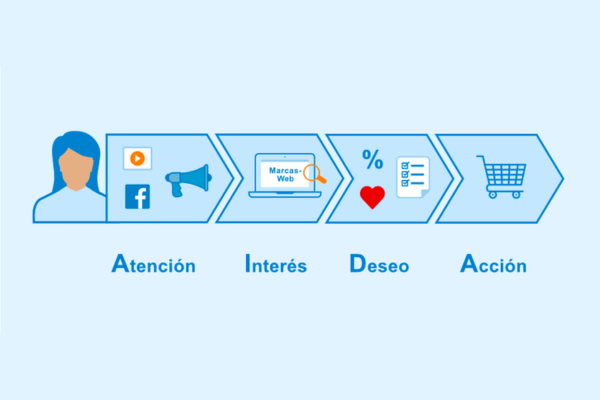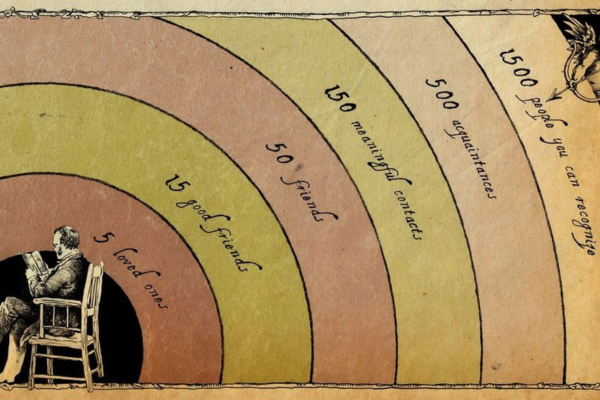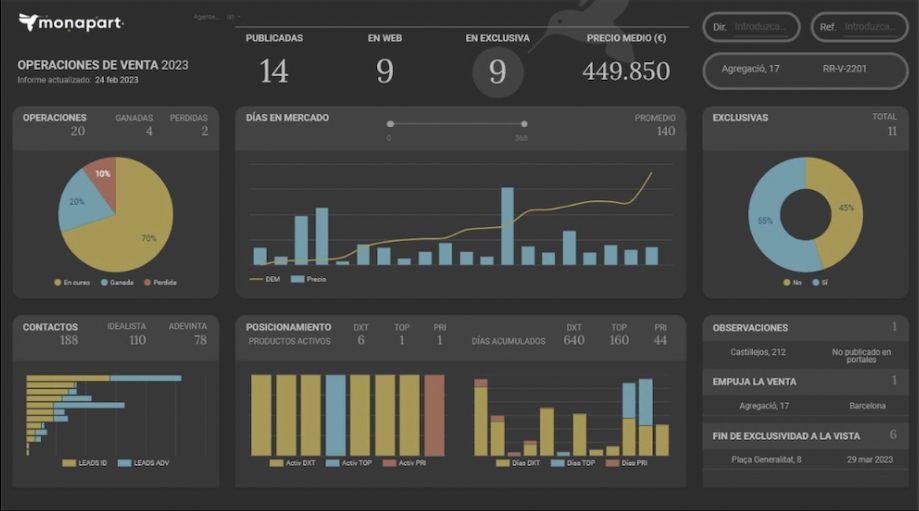The customer as the permanent centre of gravity
The essence of marketing is precisely "radical empathy" with the customer.
One of my obsessions as marketing manager at Monapart is the customer. And although it sounds commonplace, on a day-to-day basis, when we analyse and perfect our value proposition, deploy new processes, creativity, narratives, etc. it is easy for "business life to get in the way" (it always does) and the customer and their needs to be the first thing we overlook.
This is why we must always be alert, because the essence of marketing is precisely "radical empathy" with the customer.To fix our permanent centre of gravity on him. To have his image always present, literally as the famous literary agent Carmen Balcells did, with the corridors of her office full of portraits of the writers she represented. Or giving her priority in our diaries as well, for as she says Xavier Marcet: "When we talk about customer-centric companies, we mean companies that put the needs of their customers ahead of their structures." (Growing by growingpp. 160-161).
I have a permanent centre of gravity, which never makes me change my mind about things and people. - Franco Battiato
Our customer is affected by many external and internal forces (market situation, competitors, personal situation...), so it is a centre of gravity that is constantly moving, so we need to we have a customer who changes a lot, quickly and without warning.
Being able to add value requires us as professionals to be attuned to your channel and understand where you are in the sales funnel: do you know us? Are you interested in us? Do you want to hire us? Do you recommend us? Locating our customer at one point of consumption or another is key to our marketing strategy. It will allow us to act with precision and allocate resources intelligently to encourage that customer not to fall by the wayside, but to progress to decision making and beyond.
[An aside] Customer or user? A fundamental distinction

In the real estate industry, there are seller's agencies and buyer's agencies that specialise in offering Personal Property Shopping services. In this article I focus on the sales funnel of the owner-seller client and what real estate agents can do (and what they should avoid) to help them move from one stage to the next. This owner-seller is the one who "bites" on our promise as a company, the subject of our value proposition, the one who gives us their trust and who pays for the service.
The buyer who contacts us interested in this or that property is a user of our services, not a client.. He has seen a house that he likes, that fits what he needs and he is already excitedly planning where to put the sofa or the child's room. Here our promise as a brand, our narrative..., well, the truth is, he doesn't give a damn.
It is very important to understand where we are putting resources and to whom they are directed.
AIDA is not just a Verdi opera

The AIDA concept was developed by the American businessman Elias St. Elmo Lewis in 1898 to describe the series of stages (Attention-Interest-Desire-Action) customers go through when making purchasing decisions. Let us review each of these 4 stages with specific examples useful for real estate agents.
Give me an A for Attention

In order for our potential customers to consider us, it is essential that they first get to know us. How? By walking where he walks and letting us know: where he moves / shops / eats / dresses / takes the kids to school / has a drink / goes on holiday, etc. What is his digital behaviour? Is he more Instagram or does he spend the day on Linkedin? How does he get information? Technology has extended our reach so much so a well orchestrated combination of online + offline tactics to gain awareness will maximise results..
Real estate agent, can you be sure at this point that your entire circle of influence knows what you do for a living?
What can an estate agent do to make himself known?
- Create a database with the contacts that make up your circle of influence. Once listed and properly parameterised, you will be able to detect segments / positioning (area, product, type of customer, interest...) and to understand which combination of tactics, messages, recurrences and channels are optimal for each type of customer. We won't address a close friend in the same way as an exclient or a collaborator, will we?
- Create a network of prescribers whom you reward for each sale you close from a lead referred by them. Shops in the area, lawyers, doormen... It is important that this agreement is formalised and that the agent makes it dynamic in order to activate the powerful word-of-mouth.
- Mailing campaigns, knowing that it is a strategy that works by sedimentation: it asks for recurrence and concentration in a given area.
- Relevant content for the target customer published on a blog / own website and syndicated on social profiles.
- Digital advertising (Google Ads, Social Ads) with the right targeting to invest wisely.
What not to do?
- Spamming with messages by land, sea and air to owners who are selling on their own, offering them services that they have NOT asked for and that they obviously do NOT want. It's a real shot in the foot.
- Neglect acquaintances, the most organic, convertible and cost-effective lead.
Give me an I of Interest

Ok, the client already knows us, there is a certain real estate concern in him and he is flirting with the possibility of selling his house, he will start to inform himself. Will he take us into consideration? In principle, for him all agents are the same, there are many of them and they all have the same message, that's why, differentiation is key to seduce and arouse interest.
25% of homeowners in this country consider selling their home at least once a year.
What can an estate agent do to arouse interest?
- It is essential to understand the codes of each channel and to put yourself in the shoes of your interlocutor. For example: Instagram is a primarily an environment for escapism. What will attract more attention: a beautiful photo of a house accompanied by a short story or talking about how much I sell?
- Finding your own voice and being authentic. The profession of an agent is precious and there is much to share, as no day is the same as another and your own activity is an inexhaustible source of anecdotes, homes, corners of the city, doubts or real estate reflections rooted in your area of activity...
- Understand that the conversation must be encouraged first, the sale will come later.
What not to do?
- I don't think that in the world of Google and ChatGPT the agent will be interested in talking about the municipal capital gains or the taxes associated with the sale and purchase. The information is available to everyone and it is difficult for them to cultivate a bond with their interlocutor.
- Hiding behind a logo, showing a very corporate image and hollow guru narratives because it is tiresome, does not invite dialogue, is not credible and scares people away. Real estate agents are people who serve people and sell trust, so they should always keep their gaze at the same level as that of their interlocutor.
- Neglecting your digital presence. Outdated and incomplete profiles where it is not clear to the user what we do and where, are an immediate downer.
Give me a D for Desire

To have a client who knows us, who is considering giving us their confidence to sell their house and who finally contacts us to make the final decision is, at this stage of the film, almost a miracle. And what's more, the customer comes to us very well informed, very focused, looking for answers to their questions and authority.. It will jump from advertising banners or social media posts and go straight to the services page of the website, to the "about us" or to our agent landing page to get to know us better and find elements of security (experience, certifications, training...).
At this stage we have a clear objective: to incentivise conversion so that our potential customer loses his or her adjective and signs the order form.
What can you do as a real estate agent to encourage conversion?
- Don't put up barriers to reach us: Is it easy to find information about our services on our website, do we answer your questions, does the page load fast, does it look good on your mobile? When you call us, do you pick up the phone quickly or do you have to listen to 4 symphonies?
- Have a complete and updated Linkedin because our potential client will look there for professional solvency and authority.
- Taking care of your reputation and sharing testimonials from satisfied customers (without going overboard) will reassure the potential customer. This is a critical aspect.
- Facilitate a personal meeting if the client passes a first qualification call (because not everyone is our client...). Go to the meeting well equipped with materials that reinforce your brand/professional values.
- Being able to listen, react and be concrete is key in this phase in order to always be one step ahead, to be fast and focused on delivering value that allows the customer to make an informed decision.
What not to do?
- Overwhelm and show needwhich is about as unpersuasive as it gets.
- Putting seduction on hold because it's time to get down to the facts and get straight to the point.
Give me an A for Action

Finally, our potential client loses his adjective and signs the order form. From this moment on, the relationship takes on a different aspect because there is a signed commitment and we are now officially his partner in the adventure of selling his house.
What does he expect from us? Multiple channels of contact (convenience), speed and solvency in the responses (reliability), emotional intelligence / empathy that will allay fears and provide a sincere and professional accompaniment (closeness), together with an impeccable real estate service (valuation, maximum care in the preparation of the property and its publication on portals, document management, etc.). )... All these are hygienic factors, "what our client pays us for" and which are "assumed", but are not sufficient.
There is no doubt that the real estate sector bases its business model on generating leads, attracting new clients, closing deals and retaining a percentage of each transaction, in the same way that Disneyland generates money from ticket sales, restaurants or souvenir shops full of merchandising. But it is one thing to "make money" and another thing to be successfulunderstood here as the ability to create such a memorable experience for the client that they will always remember us with a smile, want to repeat and, above all, recommend us.
It is a mistake to limit the relationship with the client to the strict duration of the service. The day of the signing at the notary's office is an end that is in fact a beginning.
What do you do as a real estate agent to create a memorable customer experience?
- Let's look at how we cultivate the bond with the customer: Do they feel important within the organisation? Are they listened to? Are they kept informed? Are they asked for feedback? Do they get personal attention or do they listen to three symphonies before talking to someone? How is a crisis managed? Are they called to congratulate them on their birthday? Are they rewarded for their loyalty?
- Let's look at how we can go beyond the core service and exceed your expectations so that our client has a WOW experience. The day of the signing at the notary's office, for example, is a moment of maximum intensity and emotion.
- Deploy tactics that keep the relationship with the customer alive: newsletters, content, telephone follow-up, events, congratulations, etc.
What not to do?
Strictly confine the relationship with the client to the duration of the service. Again, the day of signing at the Notary's office is an end which is in reality a beginning; as it says José Luis Echeverría Manau: "A good after-sale is the pre-sale of the next sale."
Bonus Track: They are not customers, they are fans

In our sector we live primarily on recommendation, because we cannot encourage repeat business, so most of the time, the customer journey is one-way. If we are clear about this, then we see that as professionals we must put the high beams on (the focus on the customer) and not the low beams on (the focus on the sale).
"Mediocre brands have buyers, interesting brands have fans."
The satisfied customer is the most important asset, and the referred lead is organic, the easiest to convert and the most economical.. For all of us, an evangelising client, an admirer, is much more valuable than a simple purchaser of our services, isn't it?





